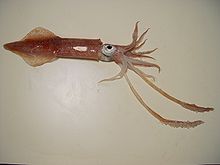Squids Could Hold Key To Providing Valuable Answers Into The Origin and Evolution of Hearing
Loligo pealeii, an ordinary run of the mill squid – most famous for being a source of food for many creatures in the sea – might just become a VIP in the science world, as it is making waves by providing tidbits and insights into the origin and evolution of the sense of hearing.
The Woods Hole Oceanographic Institution, housed in a militaristic style building, is home to T. Aran Mooney, a biologist who is exploring the interesting theory: Can squid hear? Can they actually hear predators or enemies coming up on them? How do squid and other aquatic animals depend on sound to communicate, migrate, and interact on a day to day basis? Will the increasing amount of noise pollution we are pumping into the world’s oceans have a catastrophic effect on the squid, and other animals hearing ability, and ultimately, their survival?
“The sound in the ocean is increasing…commercial shipping, oil and gas exploration…those make a lot of noise,” Mooney explains. “And you don’t know how that is going to affect the animal unless you know what it hears.”
A postdoctoral scholar at WHOI, Mooney, has taken it upon himself to partake in seminal investigations into the hearing of the squid. His results were recently released this past Friday in the Journal of Experimental Biology.
This research has taken on a whole new light, as many aquatic animals rely on the squid, and if we are endangering its hearing ability, we are not only endangering our chances of finding out more about the development of the sense of hearing, but we could potentially throw the whole balance of the world’s oceans out of whack.
